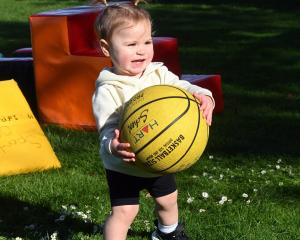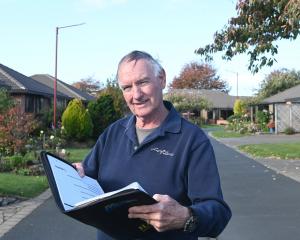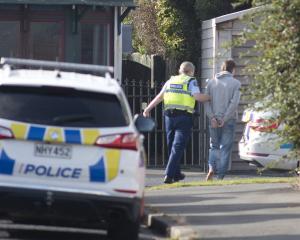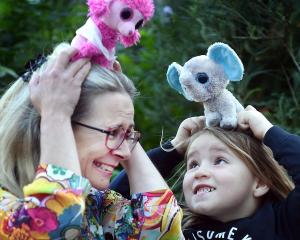That attitude - ''always say yes and figure out afterwards how to do it'' - has seen him lead an adventure-filled life.
Whether it has been farming in Hungary or leading New Zealand's Winter Olympic team, it is a long way from growing up on Mount Dasher Station, near Five Forks, in the heart of rural North Otago.
Mr Wardell, chef de mission for the New Zealand team to the Winter Olympics in Vancouver in 2010 and again to Sochi this year, was an entertaining guest speaker at Newhaven Perendales' recent client focus day, held at Redbank Station at Macraes.
Mr Wardell was also a great believer that farmers could ''do anything'' and said they often sold themselves short.
His own farming experience gave him an excellent grounding for his future career path.
After leaving school, Mr Wardell completed an agricultural science degree at Lincoln College in 1973. (He is now a member of the Lincoln University Council).
That was followed by a year working for the Tussock Grasslands and Mountain Lands Institute - an ''awesome job'' that involved visiting South Island pastoral lease properties - before he returned to Mount Dasher and farmed for 15 years.
He then received a call one night asking if he would be interested in establishing some sheep and beef demonstration farms in Hungary for Pyne Gould Guinness.
The call came about 9.30pm and he was to reply by 10am the next day. Luckily, his wife, Jane, was also keen on adventure and they headed overseas with their three small children.
At that time, Hungary had a grain quota it had to supply to Russia each year, which did not leave any grain for livestock.
The role of the New Zealanders was to increase livestock production without touching any grain, and a lot of that was done through direct drilling into cropland.
The sheep had been kept indoors year-round and while it was a ''real battle'' to get the Hungarians to leave them outside, they did succeed in doing so, Mr Wardell said.
When they arrived, the stock were ''pretty terrible'' and several planeloads of New Zealand Corriedale and Romney sheep were sent over, along with a planeload of Hereford cattle from Canada.
The mothering instinct of the indigenous sheep, similar to a meat merino, had been ''totally destroyed'' and when they lambed outside, the ewes would have the lamb and then ''bugger off'', he recalled.
The Corriedales, in particular, were ''fabulous'' and the Hungarians could not believe how they would ''butt you out of the road'' to stop their lambs being touched.
While the task at hand was technically simple and the increase in animal productivity became ''massive'', the hardest thing was persuading people to make changes and vets were the most difficult, he said.
While the group of four that went over, to two different farms, were ''very gung-ho'' when they arrived, they had to backtrack a little.
''It was a people-skills thing; you had to persuade them it was their idea,'' he said.
While in Eastern Europe, Mr Wardell also later spent several years working for Monsanto and trading commodities, which was an ''amazing'' experience.
On returning to New Zealand in the early 1990s, he settled in Christchurch and Mount Dasher Station was sold.
He became a sharebroker and joined Forsyth Barr, later becoming a partner in the firm before retiring in March this year.
While in Christchurch, he had a small farm and fattened beef cattle, and he joked he was the only client that the agent came to visit in a high-rise office tower.
Now living at Lake Hawea, Mr Wardell, a keen sportsman, has enjoyed his chef de mission roles.
The planning process started about three years before the Winter Olympics were held.
Sometime this year, a decision would be made on the chef de mission for the 2018 games in South Korea, and Mr Wardell was yet to decide whether to put his hand up.
Sochi was the best Winter Olympics New Zealand had had since 1992, when Annelise Coberger won a silver medal in the slalom.
Potentially, it was better than that year, with the 15-strong contingent gaining fourth, fifth, sixth, eighth, ninth and 11th placings and coming ''desperately close'' to getting a medal with Jossi Wells, who finished fourth in the men's freeski halfpipe final.
During the Games, Mr Wardell managed to present Russian President Vladimir Putin with a New Zealand pin, despite him being surrounded by bodyguards.
Quipping that although it had been a long time since he had played rugby, he still had a ''wee bit of a side step''.
While about to get the ''heave-ho'' from an enormous bodyguard, he was recognised by the Minister of Sport and able to give Mr Putin the pin.
''That's what you call being an opportunist,'' he quipped.
Mr Wardell, who has been to the Antarctic and climbed Mt Kilimanjaro, said he had always liked ''doing stuff''.
''I don't like sitting still.''
• Mr Wardell's eldest daughter, Rebecca, who retired as an elite-level heptathlete in 2012, represented New Zealand at the Beijing Olympics in 2008 and the Commonwealth Games in 2006 in Melbourne and 2010 in Delhi.












